#canadian labour movement
Explore tagged Tumblr posts
Text
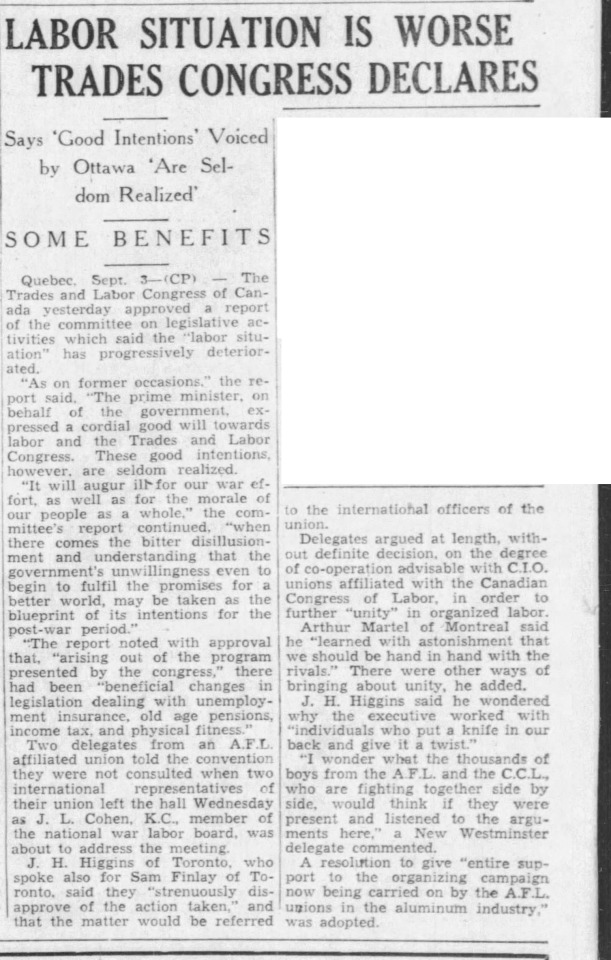
"LABOR SITUATION IS WORSE TRADES CONGRESS DECLARES," Toronto Star. September 3, 1943. Page 3. --- Says 'Good Intentions' Voiced by Ottawa 'Are Seldom Realized --- SOME BENEFITS ---- Quebec, Sept. 3 - (CP) - The Trades and Labor Congress of Canada yesterday approved a report of the committee on legislative activities which said the "labor situation" has progressively deteriorated.
"As on former occasions," the report said, "The prime minister, on behalf of the government, expressed a cordial good will towards labor and the Trades and Labor Congress. These good intentions, however, are seldom realized.
"It will augur ill for our war effort, as well as for the morale of our people as a whole," the committee's report continued, "when there comes the bitter disillusionment and understanding that the government's unwillingness even to begin to fulfill the promises for a better world, may be taken as the blueprint of its intentions for the post-war period."
"The report noted with approval that, "arising out of the program presented by the congress," there had been beneficial changes in legislation dealing with unemployment insurance, old age pensions, income tax, and physical fitness."
Two delegates from an A.F.L. affiliated union told the convention they were not consulted when two international representatives of their union left the hall Wednesday as J. L. Cohen, K.C., member of the national war labor board, was about to address the meeting.
J. H. Higgins of Toronto, spoke also for Sam Finlay of Toronto, said they "strenuously disapprove of the action taken," and that the matter would be referred to the international officers of the union.
Delegates argued at length, without definite decision, on the degree of co-operation advisable with C.I.O. unions affiliated with the Canadian Congress of Labor, in order to further "unity" in organized labor.
Arthur Martel of Montreal said he "learned with astonishment that we should be hand in hand with the rivals." There were other ways of bringing about unity, he added.
J. H. Higgins said he wondered why the executive worked with "individuals who put a knife in our back and give it a twist."
"I wonder what the thousands of boys from the A.F.L. and the C.C.L., who are fighting together side by side, would think if they were present and listened to the arguments here," a New Westminster delegate commented.
A resolution to give "entire support to the organizing campaign now being carried on by the A.FL. unions in the aluminum industry," was adopted.
#ville de québec#trades and labor congress of canada#american federation of labor#canadian labour movement#labour bureaucrats#craft unions#reformist unions#union politics#working class politics#canada during world war 2#quebec city
0 notes
Text
The Nine Hour Movement
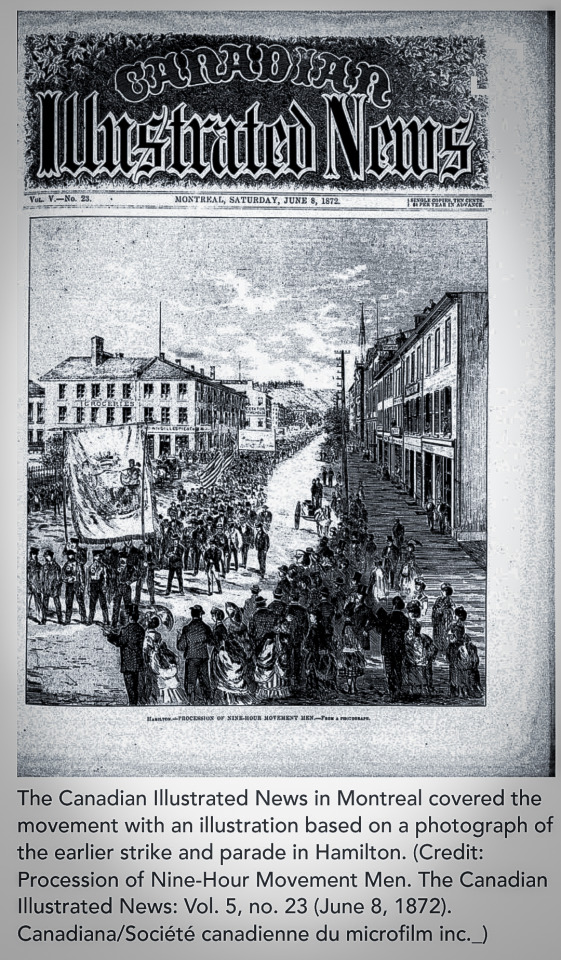
The Nine Hour Movement
Understanding the workers’ protests that paved the way for the creation of unions to advocate for workers’ rights.
#canadian#labor unions#canadian unions#labour#stikers#1872#9 hour movement#know your history#history#canadian history#canada
0 notes
Text
D-Day was 80 years ago today!
D-Day was the first day of Operation Overlord, the Allied attack on German-occupied Western Europe, which began on the beaches of Normandy, France, on 6 June 1944. Primarily US, British, and Canadian troops, with naval and air support, attacked five beaches, landing some 135,000 men in a day widely considered to have changed history.
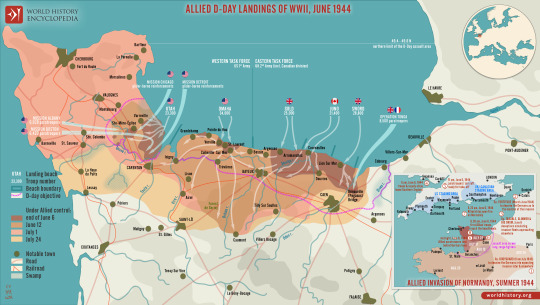
Where to Attack?
Operation Overlord, which sought to attack occupied Europe starting with an amphibious landing in northwest France, Belgium, or the Netherlands, had been in the planning since January 1943 when Allied leaders agreed to the build-up of British and US troops in Britain. The Allies were unsure where exactly to land, but the requirements were simple: as short a sea crossing as possible and within range of Allied fighter cover. A third requirement was to have a major port nearby, which could be captured and used to land further troops and equipment. The best fit seemed to be Normandy with its flat beaches and port of Cherbourg.
The Atlantic Wall
The leader of Nazi Germany, Adolf Hitler (1889-1945), called his western line of defences the Atlantic Wall. It had gaps but presented an impressive string of fortifications along the coast from Spain to the Netherlands. Construction of gun batteries, bunker networks, and observation posts began as early as 1942.
Many of the German divisions were not crack troops but inexperienced soldiers, who were spending more time building defences than in vital military training. There was a woeful lack of materials for Hitler's dream of the Atlantic Wall, really something of a Swiss cheese, with some strong areas, but many holes. The German army was not provided with sufficient mines, explosives, concrete, or labourers to better protect the coastline. At least one-third of gun positions still had no casement protection. Many installations were not bomb-proof. Another serious weakness was naval and air support. The navy had a mere 4 destroyers available and 39 E-boats while the Luftwaffe's (German Air Force's) contribution was equally paltry with only 319 planes operating in the skies when the invasion took place (rising to 1,000) in the second week.
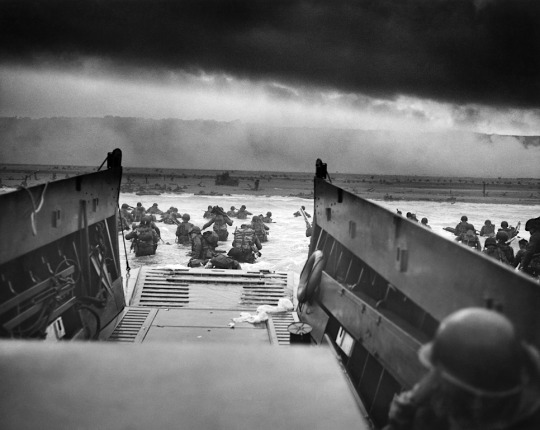
Neptune to Normandy
Preparation for Overlord occurred right through April and May of 1940 when the Royal Air Force (RAF) and United States Air Force (USAAF) relentlessly bombed communications and transportation systems in France as well as coastal defences, airfields, industrial targets, and military installations. In total, over 200,000 missions were conducted to weaken as much as possible the Nazi defences ready for the infantry troops about to be involved in the largest troop movement in history. The French Resistance also played their part in preparing the way by blowing up train lines and communication systems that would ensure the defenders could not effectively respond to the invasion.
The Allied fleet of 7,000 vessels of all kinds departed from English south-coast ports such as Falmouth, Plymouth, Poole, Portsmouth, Newhaven, and Harwich. In an operation code-named Neptune, the ships gathered off Portsmouth in a zone called 'Piccadilly Circus' after the busy London road junction, and then made their way to Normandy and the assault areas. At the same time, gliders and planes flew to the Cherbourg peninsula in the west and Ouistreham on the eastern edge of the planned landing. Paratroopers of the 82nd and 101st US Airborne Division attacked in the west to try and cut off Cherbourg. At the eastern extremity of the operation, paratroopers of the 6th British Airborne Division aimed to secure Pegasus Bridge over the Caen Canal. Other tasks of the paratrooper and glider units were to destroy bridges to impede the enemy, hold others necessary for the invasion to progress, destroy gun emplacements, secure the beach exits, and protect the invasion's flanks.
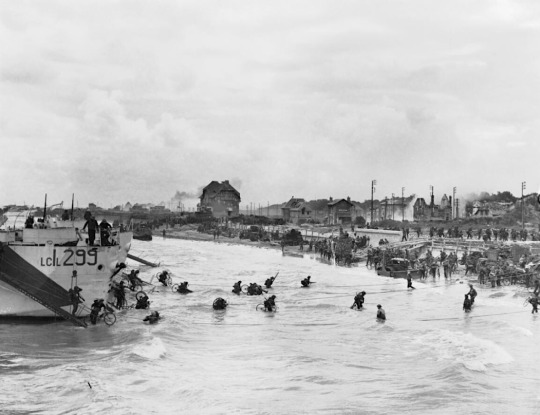
The Beaches
The amphibious attack was set for dawn on 5 June, daylight being a requirement for the necessary air and naval support. Bad weather led to a postponement of 24 hours. Shortly after midnight, the first waves of 23,000 British and American paratroopers landed in France. US paratroopers who dropped near Ste-Mère-Église ensured this was the first French town to be liberated. From 3.00 a.m., air and naval bombardment of the Normandy coast began, letting up just 15 minutes before the first infantry troops landed on the beaches at 6.30 a.m.
The beaches selected for the landings were divided into zones, each given a code name. US troops attacked two, the British army another two, and the Canadian force the fifth. These beaches and the troops assigned to them were (west to east):
Utah Beach - 4th US Infantry Division, 7th US Corps (1st US Army commanded by Lieutenant General Omar N. Bradley)
Omaha Beach - 1st US Infantry Division, 5th US Corps (1st US Army)
Gold Beach - 50th British Infantry Division, 30th British Corps (2nd British Army commanded by Lieutenant-General Miles C. Dempsey)
Juno Beach - 3rd Canadian Infantry Division (2nd British Army)
Sword Beach - 3rd British Infantry Division, 1st British Corps (2nd British Army)
In addition, the 2nd US Rangers were to attack the well-defended Pointe du Hoc between Utah and Omaha (although it turned out the guns had never been installed there), while Royal Marine Commando units attacked targets on Gold, Juno, and Sword.
The RAF and USAAF continued to protect the invasion fleet and ensure any enemy ground-based counterattack faced air attack. As the Allies could put in the air 12,000 aircraft at this stage, the Luftwaffe's aerial fightback was pitifully inadequate. On D-Day alone, the Allied air forces flew 15,000 sorties compared to the Luftwaffe's 100. Not one single Allied aircraft was lost to enemy fire on D-Day.
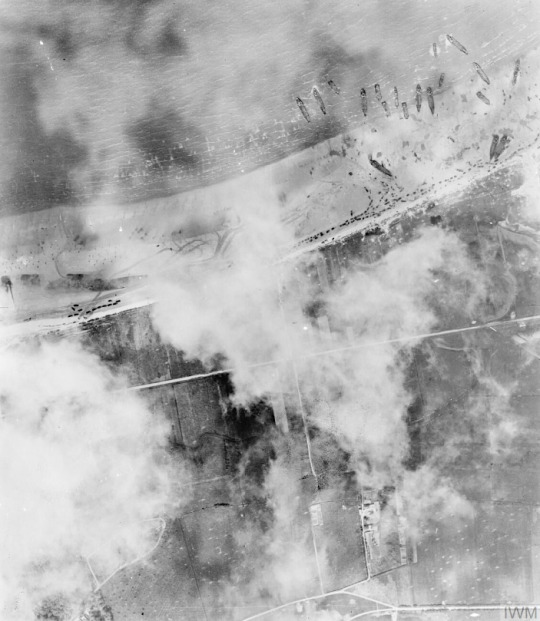
Packing Normandy
By the end of D-Day, 135,000 men had been landed and relatively few casualties were sustained – some 5,000 men. There were some serious cock-ups, notably the hopeless dispersal of the paratroopers (only 4% of the US 101st Air Division were dropped at the intended target zone), but, if anything, this caused even more confusion amongst the German commanders on the ground as it seemed the Allies were attacking everywhere. The defenders, overcoming the initial handicap that many area commanders were at a strategy conference in Rennes, did eventually organise themselves into a counterattack, deploying their reserves and pulling in troops from other parts of France. This is when French resistance and aerial bombing became crucial, seriously hampering the German army's effort to reinforce the coastal areas of Normandy. The German field commanders wanted to withdraw, regroup and attack in force, but, on 11 June, Hitler ordered there be no retreat.
All of the original invasion beaches were linked as the Allies pushed inland. To aid thousands more troops following up the initial attack, two artificial floating harbours were built. Code-named Mulberries, these were located off Omaha and Gold beaches and were built from 200 prefabricated units. A storm hit on 20 June, destroying the Mulberry Harbour off Omaha, but the one at Gold was still serviceable, allowing some 11,000 tons of material to be landed every 24 hours. The other problem for the Allies was how to supply thousands of vehicles with the fuel they needed. The short-term solution, code-named Tombola, was to have tanker ships pump fuel to storage tanks on shore, using buoyed pipelines. The longer-term solution was code-named Pluto (Pipeline Under the Ocean), a pipeline under the Channel to Cherbourg through which fuel could be pumped. Cherbourg was taken on 27 June and was used to ship in more troops and supplies, although the defenders had sunk ships to block the harbour and these took some six weeks to fully clear.
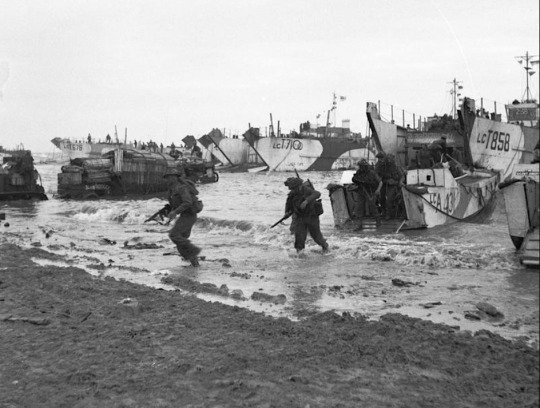
Operation Neptune officially ended on 30 June. Around 850,000 men, 148,800 vehicles, and 570,000 tons of stores and equipment had been landed since D-Day. The next phase of Overlord was to push the occupiers out of Normandy. The defenders were not only having logistical problems but also command issues as Hitler replaced Rundstedt with Field Marshal Günther von Kluge (1882-1944) and formally warned Rommel not to be defeatist.
Aftermath: The Normandy Campaign
By early July, the Allies, having not got further south than around 20 miles (32 km) from the coast, were behind schedule. Poor weather was limiting the role of aircraft in the advance. The German forces were using the countryside well to slow the Allied advance – countless small fields enclosed with trees and hedgerows which limited visibility and made tanks vulnerable to ambush. Caen was staunchly defended and required Allied bombers to obliterate the city on 7 July. The German troops withdrew but still held one-half of the city. The Allies lost around 500 tanks trying to take Caen, vital to any push further south. The advance to Avranches was equally tortuous, and 40,000 men were lost in two weeks of heavy fighting. By the end of July, the Allies had taken Caen, Avranches, and the vital bridge at Pontaubault. From 1 August, Patton and the US Third Army were punching south at the western side of the offensive, and the Brittany ports of St. Malo, Brest, and Lorient were taken.
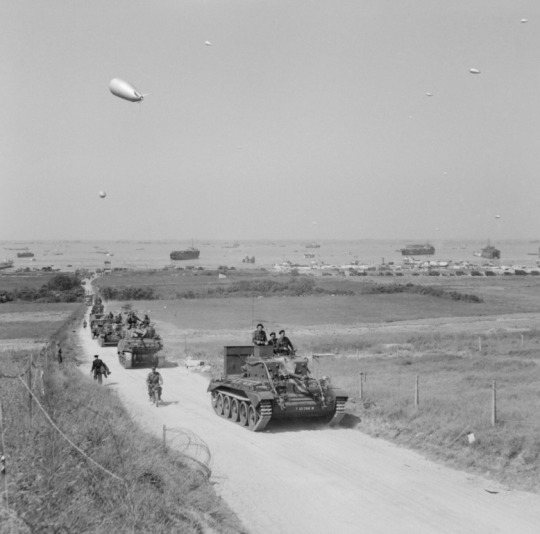
German forces counterattacked to try and retake Avranches, but Allied air power was decisive. Through August 1940, the Allies swept southwards to the Loire River from St. Nazaire to Orléans. On 15 August, a major landing took place on the southwest coast of France (French Riviera landings) and Marseille was captured on 28 August. In northern France, the Allies captured enough territory, ports, and airfields for a massive increase in material support. On 25 August, Paris was liberated. By mid-September, the Allied troops in the north and south of France had linked up and the campaign front expanded eastwards pushing on to the borders of Germany. There would be setbacks like Operation Market Garden of September and a brief fightback at the Battle of the Bulge in December 1944, but the direction of the war and ultimate Allied victory was now a question of not if but when.
139 notes
·
View notes
Text
Palestine solidarity activists across Canada co-ordinated blockades at the offices of several arms manufacturers this week and renewed calls for an immediate embargo on all military exports to Israel. The Maple was on the ground in Toronto and Calgary at the protest actions that took place in those cities. Other blockades also took place in Vancouver, Quebec City, Peterborough, Kitchener-Waterloo, and Victoria this week. More than 200 workers, union members and other activists from across the Greater Toronto Area set up picket lines and blocked the morning shift of the TTM Technologies facility on Monday morning. The action included activists from World Beyond War Canada (WBW), Labour for Palestine (LFP), Jews Say No To Genocide, Palestinian Youth Movement (PYM), and trade unions.
Continue Reading
Tagging @politicsofcanada
#cdnpoli#canada#canadian politics#canadian news#solidarity with palestine#canada arms israel#direct action#arms embargo
190 notes
·
View notes
Text
Holy shit an actual newspaper somehow managed to commit an act of real journalism and published an investigative report into the Canadian Nazi problem. Probably because the opening of the Memorial to the Victims of Communism monument this month has really brought the whole "we wholesale imported Eastern European Nazis into this country to suppress politically leftwing, ethnic identified labour movements, many of those Nazis kids hold positions of power" the thing into the spotlight again. And every time it gets brought into the spotlight (the increasingly insistent questions surrounding the groups who pushed for the construction of this monument, the ongoing criminal trial of a journalist for felony hate crimes for vandalizing a monument to the 14th SS 'Galicia" Division, the "Hunka incident") more and more normal people (i.e. people whose brains aren't broken in the way where they're compelled to spend many hours reading about the minute ideological squabbles among competing European fascist streams, or who the hell losers behind a certain Neo-Nazi splinter group are etc.) are forced to ask the question "So who was this Roman Shukhevych fellow?" and its follow-up "Jesus Christ, why the fuck are there monuments to this man in Canada?"
Anyway, it's a really good article, read the whole thing.
19 notes
·
View notes
Text
As socialists, we need people to believe real, positive change is possible. Most people can’t see beyond the current system, but they can tell that it is broken. This leads to hopelessness and apathy. Complacency. I believe real change is possible, but change is not on the ballot this election, or indeed any election (except, perhaps, negative change: a cancelling of the meagre improvements to the social safety net added in the past few years under a potential conservative government, and international trade leading to the disempowerment of workers - whether that be in the form of a return to free trade or a continuation of these new tariff policies). The conservatives offer suffering, the liberals no relief, and the NDP the smallest of reforms. Socialists must be the ones who offer real change for working people. Let’s look into the failures of each of the 3 major parties.
Firstly, conservatives don’t only want to maintain the system, they want to make it worse - on an accelerated course. They’d cut from healthcare and possibly eliminate dentalcare, pharmacare, and childcare entirely. Conservatives believe cutting taxes is an affordability measure - rather than a give away to the rich. They have no plan for climate change whatsoever and are endorsed by billionaires - both Canadian and American. They hate unions, they hate the poor, the hate those who are addicted to substances or who cannot find shelter. They want to make life harder for the masses so the rich can exploit us harder. They’ve promised to repeal labour-friendly legislation, privatize more infrastructure, and weaken regulations around dangerous industries — all while offering up hollow culture war distractions to keep people divided and misinformed. Their base is kept loyal through fear and resentment, but their donors are loyal because the Conservatives deliver: lower corporate taxes, deregulation, and union-busting. Their political project is one of austerity and authoritarianism: dismantling public services, criminalizing dissent, and gutting environmental protections. While they talk about "freedom" and "choice," their policies concentrate power and wealth into the hands of corporations and the ultra-rich.
On the other hand, we’ve lived under the liberals for nearly 10 years, and things haven’t gotten better. Rent has gotten more expensive because liberals side with landlords and speculators over working people who need a place to live. Food has gotten more expensive because liberals side with big grocery chains ripping us off over the right of people to eat, and it’s not like farm workers are paid well in return. In fact, the UN recently called the temporary foreign workers program, which the agricultural sector gets the most permits for, a "breeding ground for contemporary forms of slavery." Other essentials like telecommunications have also become more expensive, as the liberals side with monopolies over people, as demonstrated by allowing Rogers and Shaw to merge. All of this while they lie and flip flop on the issue of the day, whether it be climate action or Palestinian liberation. Let us not forget, the liberal government under labour minister Steven Mickenen (now reassigned to “jobs and families”) broke 3 strikes (or 4, depending how you count it) using section 107 of the labour code last year: the rail workers in august, dockworkers in November, and the postal workers in december. Carney hasn’t shown any sign of changing this - much the opposite. He worked for Goldman sachs in the 1990’s and early 2000s - right when jeffery sachs was “advising” the post-soviet economies, otherwise known as crushing the solidarity movement in poland and helping yeltsin and his cronies sell off the state in russia. He’s more recently worked at brookfield - a corporate landlord and tax dodger, among other things, which recently announced that “the future is debt” - meaning they make money off of the suffering of the working class by burying them in debt. As prime minister, his first moves have been lowering the capital gains tax and a cabinet shuffle which seems to get rid of important positions like disability minister and gender equality minister - now subsumed into steven guilbeau’s culture ministry, and rename a whole set of ministries (including labour) into the portfolio of “jobs and families” and give this important position, now with a less pro-labour framing (not that the liberals were ever pro-labour, as discussed before) to everyone’s least favourite minister and strikebreaker in chief: steven mickenin.
So what really makes a liberal government different from a conservative? The record shows… not much, with the two parties voting together to block progressive reform over 600 times between 2004 and 2021, according to the breach. Their policy consensus includes “huge tax breaks to corporations, a punitive criminal justice system, a less generous social welfare state, a restrictive immigration system, a hugely profitable private pharmaceutical regime, pro-corporate trade deals abroad, and opposition to expanding workers’ rights.” Under Paul Martin, this came in the form of blocking anti-scab legislation, which has now been forced through by the NDP, more restrictive immigration rules and less accessible EI, maintaining unsafe federal workplaces by refusing to ban “psychological harassment,” and siding with pharmicetical companies over people who require medicine to live. Under stephen harper, the party duopoly agreed to refuse to enforce safe practices by the rail companies, allow pollution, maintain the right of the defense minister to authorize offensive overseas missions without the approval of parliament, refuse to give lighter sentences to young people, refuse to compensate those who’s employer robbed them by not contributing to their pension, passing back to work legislation (which the Harper government used many times, including against workers at Air Canada, Canada Post, and CP Rail), advancing free trade, passing bill C-51 (the anti terrorism bill), lowering the capital gains tax (which the liberal government undid and then re-did), passing the “Zero Tolerance for Barbaric Cultural Practices Act” (bet you didn’t know the liberals voted for that one), and refusing to increase safety standards for pregnant or nursing employees. Under the trudeau government (up to 2021), they refused to coordinate a strategy to end poverty, refused to guarantee housing as a right, continued selling weapons abroad (tanks to the Saudis and bombs to Israel etc.), refused to expunge records for past crimes relating to (now legal) cannabis, refused to enforce international law, allowed for discrimination based on “social condition” (which I think means class?), failed to adequately regulate commercial fishing, refused to commit to paris climate goals, refused to establish national pharmacare (now partially pushed through by the NDP), allowed the Canada Pension Plan to invest in unethical businesses including ones which do not meet basic environmental or workers’ rights standards, refused to establish national dentalcare (now partially pushed through by the ndp), and refused to establish a wealth tax or provide affordable telecommunication services. This long record shows what we’ve always known to be true: liberal, tory, same old story.
If not liberals or tories, why not the NDP? The NDP claims to be the party of the working class. They do not fill this role effectively, and they are losing ground in the polls because they cannot offer a real alternative to capitalism, instead framing themselves as slightly nicer liberals who will expand pharmacare and EI: good ideas, but not nearly enough. The NDP plays a frustrating and contradictory role in Canadian politics. On the one hand, they have used their position to push through partial wins — the early stages of pharmacare and dental care being key examples, as well as anti-scab legislation. On the other, their refusal to break with liberalism in any meaningful way makes them appear weak and directionless. Instead of mobilizing the anger and desperation many working people feel, they seek to temper it — framing small reforms as radical change while avoiding confrontation with the wealthy. They speak the language of justice but fear the consequences of acting on it. Even within their own party, there’s a tendency to sideline grassroots voices in favour of PR consultants and central office messaging. This alienates not just the left, but ordinary people who are tired of being pandered to without being listened to. If the NDP cannot define itself against both the liberals and the conservatives — if it cannot imagine and fight for a world beyond capitalism — it risks irrelevance, even as conditions worsen.
So what of the election? I do recommend voting to avoid the worst (for example, i’ll be voting for Elizabeth May next week when advance polling opens even though I don’t particularly like her or the green party) - but that is a minimum “action”, and cannot be the extent for our politics. The liberals are winning because they’re the “rally around the flag” party. Carney can get away with offering less because people are scared of Trump and American dominance in international trade - which is a real problem. But the problem isn’t america, or americans, most of whom are working class people just like in Canada and every other nation, but the american bosses and corporations who seek to take over every industry everywhere they can with the cheapest labour available. And due to this newfound (especially among liberals) nationalism, people forget the enemy at home. People cheer for loblaws and SNC lavalin (or whatever they call themselves now) as brilliant examples of Canadian industry. Company groups appear on the news - sometimes next to union representatives - in a disgusting display of class collaborationism against the perceived enemy. Canada needs neither an election nor a trade war - it needs a socialist revolution to bring true democracy and true freedom to the Canadian worker, and eventually, the workers of the world.
#politics#canada election 2025#liberal tory same old story#socialism#electoral politics#this is meant to be a speech btw#idk how well it'll go#maybe I'll tell y'all about how it went later
4 notes
·
View notes
Text
Vivian Silver (d. 7 October 2023) was born on this day, February 2, in 1949. Silver was a Canadian-Israeli peace activist.
Silver, born and raised in Manitoba, became involved in activism as a college student in the late 1960s and early 1970s, and organized the first National Conference of Jewish Women with Shifra Bronznick in 1973. She immigrated to Israel in 1974 as part of the labour Zionist movement, and became a member of a kibbutz, a communal agricultural community. Her early activism there focused on women's rights and gender disparities in Israeli society.
In 1990, she and her family moved to Be'eri, a kibbutz near the Gaza border. In Be'eri, she became better acquainted with both Gazans and local Bedouins, and her activism shifted to improving relations between the communities. This included organzing job trainings for Gazans, and ensuring that Gazan workers employed in the kibbutz were paid family. She became executive director of the Negev Institute for Strategies of Peace and Development (NISPED), a non-profit that works with Israeli and Palestinian communities to "promote peace and development through education, training, and community projects". She also worked closely with Bedouin activist Amal Elsana Alh'jooj on NISPED programs to benefit Bedouin communities.
From the early 2000s until 2014, Silver worked with a variety of human rights and peace organizations, inclding B'Tselem and Alliance for Middle East Peace. After her retirement in 2014, she volunteered to drive Gazan patients to hospitals in Jerusalem, and founded Women Wage Peace, an interfaith movement which seeks a peaceful and mutually agreed-upon end to the Israel-Palestine conflict. Silver remained involved with Women Wage Peace until her death.
Silver was killed in Be'eri on 7 October, 2023. Her remains were not identified until 13 November. Her funeral attracted around 1,500 people: both Jewish Israeli and Palestinian peace activists, politicians, and religious leaders.
4 notes
·
View notes
Text
Recently I saw a post with very racist comments, about some changes in Canadian immigration law that had affected international students attempting to legally settle in Canada.
Some of the comments were quite mean, but I think the worst were those that said it was a good thing that the changes were being implemented because companies had been hiring temporary foreign workers in order not to pay appropriate wages to Canadian citizens, who would demand more.
Wouldn't it be more just to have equal wages for all, provided they are doing the same type of work, and employ a person according to their ability?
Especially with how well-documented these strategies are, employers taking advantage of nativist and racist sentiments to break up workers' movements or never allow them to form, or cut deals directly with other governments to import foreign workers like any other commodity, who would have little to no legal recourse to protest abusive working conditions, to cut costs and depress the wages of the local workforce.
This is information that is readily available, I could easily find it online and read a book that had a whole chapter about it. The one I read, back in 2020, was Strangers from a Different Shore: A History of Asian Americans by Ronald Takaki, but there are many more cases all over the world. Immigration and labour laws need to be reformed everywhere, not only in wealthy countries. I remember when several years ago the first wave of Venezuelan refugees arrived to my country. Locals blamed migrants for depressed wages and not the local business owners who saw desperate people in desperate situations and decided to take advantage of them instead of paying them the same amount that, until then, had been paid to everyone. It's easy to feel self-satisfied when you think you're better than someone else, and it's extremely hard to influence policy but Come on. At least be aware!
8 notes
·
View notes
Text
Tired of all the Canadian and American liberals and 'progressives' crying about how wah wah, it's not true that our countries don't celebrate Labour Day, we just celebrate in September instead of May 1st like everyone else on International Workers' Day!!, we swear our countries care about workers too!!, like, can you think for maybe five seconds why the US and then Canada might declare a different day to 'celebrate' the labour movement as an official federal holiday instead of being in solidarity with international workers, can it possibly have anything to do with anti-communism, at least in part, and discouraging international solidarity, like, come on now.
5 notes
·
View notes
Text
"From the late nineteenth century onward, the labour movement became increasingly involved in suffrage debates: it endorsed suffragist organizations, joined them in lobby delegations, promoted suffrage petitions, and established women’s columns in labour newspapers. City and provincial labour parties promoted themselves as the voice of working people, endorsing an egalitarian democracy free of manipulation by the moneyed interests, a fair deal for all citizens, and a parliamentary road to social and economic reform. The female franchise was added to their election platforms, both a means and an end to their vision of steady working-class improvement. Most trade union federations eventually added female suffrage to their platforms, though they sometimes lagged behind socialist and labour parties. After the Knights of Labor declined in the early 1890s, few women were unionized, and most trade unions were ambivalent about their paid work, viewing them as mothers-in-the-making rather than as lifelong wage earners. Male unionists, however, defended better conditions for single working women and by the First World War had endorsed universal suffrage for men and women, rejecting stringent property qualifications for voters that would favour the more affluent voter. Moreover, the ideal of a male breadwinner was endorsed by some women labour suffragists who campaigned for the vote by invoking the maternal, domestic duties of working-class housewives. Suffragist, socialist, and labour movement activist May Darwin began her political life in the Toronto Union Label League, an organization that mobilized homemakers, based on their role in budgeting and buying daily necessities for the family.
Like working-class women in the United States Label Leagues, where the idea originated, Darwin believed that the energies of housewives could be harnessed to aid trade union struggles for decent wages by having women purchase union-made goods. She also represented the fluid boundaries between socialist and labour feminism. She chaired the Trades and Labour Council’s educational committee and wrote a column for its paper, the Toronto Tribune, mixing commentary on domesticity, motherhood, and femininity with invocations of class solidarity and the need for socialism. She was also a member of the Canadian Socialist League, and her speeches stressed the indispensable connections between women’s emancipation and socialism. Optimistically, she predicted that women might become the socialist vanguard since they suffered most from “the competitive system,” and they would so clearly benefit from socialism’s emphasis on “the equality of the sexes.” Yet Darwin exists on the fringes of suffrage histories, in part because of her multiple loyalties to class, gender, and socialism, in part because she sometimes wrote under a pen name in short-lived labour papers. Other rank-and-file labour suffragists are even less visible, though they spoke up during periods of working- class mobilization and crisis."
- Joan Sangster, One Hundred Years of Struggle: The History of Women and the Vote in Canada (Vancouver: UBC Press, 2019), 72-73.
#toronto#women's suffrage#suffragettes#suffrage movement#working class struggle#canadian socialism#equal pay for equal work#women in history#women in politics#women in revolt#toronto trades and labor council#academic quote#wage earners#housewives#reading 2025
3 notes
·
View notes
Text
Thess vs Canadian Politics
So beyond my minor rant about litigation and liability, a note on the elections that just took place in my home and native land.
First of all, you have no fucking idea how relieved I am. Yeah, the writing was on the wall for the Conservatives, but one thing that 2016 and 2024 taught me was that you can never, ever underestimate the depth of the well of stupidity.
Second ... while I am still mourning that Rishi Sunak didn't lose his seat to Count Binface, Pierre Poilievre losing his seat as well as the election is almost as good.
Third, and I'm really not trying to burst your bubble here ... the Conservative Party in Canada did not "get wrecked", exactly. Celebrate, yes, but once you've popped open the bubbly or cracked open the beer or whatever and toasted to that victory ... political reality time.
You could say that the Liberal Party wrecked the Conservatives in the election, but in a sideways sort of way. Just ... the wrecking was "we were doomed to lose and yet managed to get just enough votes between us and the NDP, who lost SO FUCKING MANY SEATS, to pass legislation". Canada does not quite have a hung Parliament. That is a good thing. It gets messy and obstructive and it's a really bad sign for getting shit done. The Liberals managed to stay out of that particular disaster. But it wasn't an landslide (not that those necessarily mean anything good because fucking Labour has an 80-seat majority and Starmer's using it to fuck over the disadvantaged and vulnerable across the board; it just means it's easier to ignore everything in your manifesto and do whatever the fuck you please because there aren't enough Commons votes to stop you).
Just be aware that this victory by the Liberals was a near thing. It was victory pulled from the jaws of defeat. Now, Carney was partially responsible for that ... but we come to the fourth thing now, and here's where I give praise because you guys are smarter than the UK was in similar circumstances. Because the other reason? Was Trump.
Trump started his stupid fucking tariff war. Trump got Elon Musk doing his DOGE thing. Trump got Brainworm Kennedy and fuck only knows who else to help him wipe his arse with the Constitution. But most of all? Trump would not shut the fuck up about wanting Canada as a "cherished 51st state". Thing is ... from the point of view of a Canadian, I can almost see what passes for logic in Trump's head. He's in the US. He sees 'patriotism' as flag-waving, president-worshipping, self-aggrandising ... frankly bullshit. So Canadians probably don't look very patriotic to him, so he probably thinks we don't love our country and would be happy to have a "better" one. And true, Canadians don't call ourselves patriotic, but that's only because that very American picture of patriotism seems to be the default. But ... we are patriotic, at least by the definitions of "loving your country and being proud of it". We're just not demonstrative about it. It's like a heavily introverted and undemonstrative person loving their mother - the relationship looks worse than it is because complaints look like they happen more than praise does.
But you come and you fuck with our country and we will go rabid wolverine on you. There's some debate over how much truth there is to the reputation of the Canadian armed forces in the world wars (not to mention the running joke that "the Geneva Conventions are mostly a list of 'shit that even Canada only tried once, so can we not?'") but let's face it - that wasn't an attempted invasion of territory we consider to be ours. (I am phrasing it that way because the First Nations of the entire North American continent deserve better. Just FYI.) Quebec has a separatist movement today because the French forces fought so fucking hard at Mount Royal that the English that came to conquer the place said, "Hey, you gave us a good hard fight, so you can stay Catholic and keep your French; you just have to speak English too" (so as a Montrealais who had to live with some of the Separatist crap in the 80s, THANKS FOR THAT, ENGLAND). And then there's the War of 1812 ... which, true, the English had something to do with, but the fact is that if you consider yourself a Canadian, you're pretty chill until something decides to try to take your spot, at which point you bring the fight to them, burn it to the ground, and then say, "We made our point" and go home.
So as a sign-off, my three favourite parts of the whole "Trump won the election for Carney" hilariousness (because I have to laugh or else I'll cry over the fact that it took Trump levels of idiocy to turn my country away from a bigoted asshole government, when the world needs fewer of those) -
Trump doing his "Canadians! Vote Conservative and be our CHERISHED 51st STATE! We can't support you economically forever, so let's tear down that fake barrier of a border and become ONE!" on the day of the election, when Poilievre couldn't do a proper campaign statement of "Pay No Attention To The Orange Man; It Is Not Happening" because of Canada's rules about campaigning on election day
Trump's flip-flopping all week between, "CANADIANS, VOTE CONSERVATIVE, WE WANT TO ANNEX YOU!" and "I'm actually saying all of this so that whatever they call democrats win over there, 4D CHESS!"
Basically every news outlet I've seen so far in this country having some variation of "Trump can only win elections for the other team, by being the guy no one wants to be like". There must be such tantrums in the White House today...
Still, most of my thoughts are, "Thank the gods, the country I still consider my own still has some sense" with top notes of, "I WANT TO GO HOOOOOOOOME!"
3 notes
·
View notes
Text
regardless of the exception for canada in the new tariff scheme, regardless of which of those tariffs end up being modified before they are implemented, i think the simultaneous announcement of global tariffs makes it easier for socialists in western countries generally to make the argument amongst the working class for an internationalist, rather than nationalist, response. so far the prevailing response to increased US protectionism in canada has been a frankly nauseating nationalism—and i do not think that is going away after the canadian election. it is needed for war, and war is rapidly becoming the only profitable thing. but when the integration of the global economy is an objective fact—and when the US moves against not one country but every other country on the entire planet—and when all of our bourgeois politicians are emphasizing this global interconnectedness and interdependence—does that not present a powerful opportunity to argue that the fate of the working class is global, not national? we’ll see. nationalism will probably keep its hold over automotive, steel, and related industries. the middle classes too. but there’s a real opportunity here to challenge what is probably the most severe historic deficiency in canadian socialism out in the open. struggle now on this question will be decisive for the inevitable splits that will occur in labour, democratic, and socialist organizing over the question of backing the war effort, once the imperialist crisis reaches its height. this process has already begun through the question of solidarity with Palestine, but the nationalist response to US tariffs and Amazon’s moves in Quebec—and the internationalist response to Palestine—have been able to coexist in some spaces due to the very low recent levels of political activity—into which nonprofits have swooped to demobilize the anti-zionist movement. we now need crystal clarity on internationalism and struggle against nationalism. we should be holding joint US-canada flag burnings
3 notes
·
View notes
Text
The Canadian Labour Congress has launched an emergency task force to address escalating anti-2SLGBTQ+ hate as unions across Canada begin mobilizing to defend queer and trans people in workplaces and beyond.
Unionized workplaces, such as libraries and schools, have become battlegrounds in far-right attacks against queer and trans people across the country.
Gina McKay, president of CUPE Manitoba and CLC equity vice president for 2SLGBTQ+ workers, said she’s seen hate affect workers at many levels, from hostile parents to anti-drag protests to book bans.
But the role of unions goes beyond protecting individual workers facing this hate in the workplace. The labour movement has the power to mobilize on-the-ground support, something the 2SLGBTQ+ community needs right now, McKay explained.
“That kind of organizing is exactly what we need because we know that the right is organized,” McKay told PressProgress. [...]
Continue Reading.
Tagging: @politicsofcanada, @vague-humanoid
363 notes
·
View notes
Text
Canadian Investigation: The Canadian Commission on War Criminals in Canada (Deschênes Commission) that look into allegations of war criminals residing in Canada, has not named any of the members of the Nachtigall Battalion. Moreover, it concluded, that units collaborating with the Nazis should not be indicted as a group and that mere membership in such units was not sufficient to justify prosecution.[22]
Very cool that Canada is so deep in the thrall of Ukrainian Nazis that there are two statues of Nachtigall Battalion commander, Roman Shukhevych, in this country. You know, the Nachtigall Battalion, a subunit of the Nazi Wehrmacht Brandenburgers, who were responsible for the murder of at least 300,000 Poles and Jews. You know the collaborationist group who participated in the murder of Polish intellectuals and professors in Lwów during the Lwów pogroms in 1941. I dunno, but maybe joining a fully volunteer Nazi collaborationist group should be sufficient to justify prosecution. Frankly we should've given all of these fucking collaborators and fascists over to the Soviets, but no, we had to discipline labour movements at home.
15 notes
·
View notes
Text
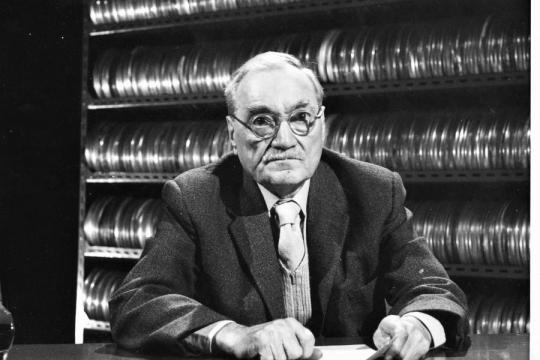
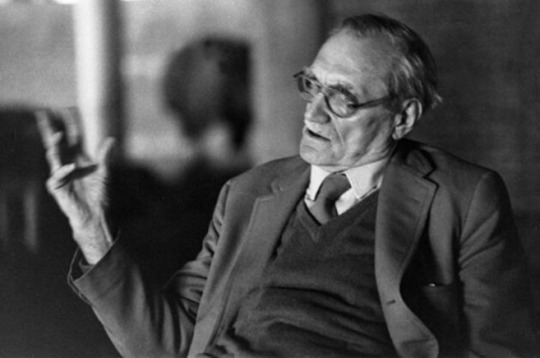
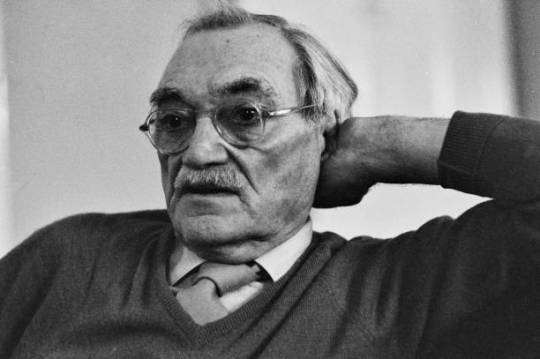
19th February 1972 saw the death of John Grierson, the Scottish film director and producer.
One of the founding members of the Documentary Movement, Grierson is seen by many as Scotland's most important filmmaker.
Grierson was born in the old schoolhouse in Deanston, near Doune, Scotland, to schoolmaster Robert Morrison Grierson from Boddam, near Peterhead, and Jane Anthony, a teacher from Ayrshire.His mother, a suffragette and ardent Labour Party activist, often took the chair at Tom Johnston's election meetings Johnston being the driving force behind our Hydro-electric scheme.
The family moved to Cambusbarron, Stirling, in 1900, when the children were still young, after Grierson's father was appointed headmaster of Cambusbarron school.
After serving on minesweepers during World War 1, he graduated from Glasgow University and served a Rockefeller fellowship in the USA, where he developed an interest in mass communications and spent some time in Hollywood. On his return to Britain, he became Assistant Films Officer at the Empire Marketing Board and was commissioned to make Drifters, a documentary about the North Sea herring fleet. In 1933 Grierson became Films Officer at the General Post Office film unit, and in both these capacities he played what has later been argued to be a pivotal role in British film culture.
Grierson's specific achievement as a director is not easy to assess, as the documentary movement took a collaborative approach to production. Grierson is only credited as directing Drifters; however, he exerted significant influence on the talented team of young filmmakers he attracted around him. Drifters contains many of the traits that would later characterise the documentary movement's output, notably an emphasis on the social interaction and everyday routine of the fishermen at sea, and on the economic importance of the fishing industry, and some technically innovative 'underwater' shots achieved at the Plymouth Marine Biological Research Station. The new montage style of Soviet cinema and the poetical style of Robert Flaherty were clear influences on Grierson.
In June 1937 Grierson resigned from the GPO and formed Film Centre, an advisory and co-ordinating body for the documentary film movement. It was this kind of supervisory capacity that characterised Grierson's role and influence on factual film, with him also acting as production advisor to Films of Scotland, and, throughout the war, serving as Film Commissioner at the National Film Board of Canada.
After a brief and fairly fruitless period in New York, Grierson returned to the UK in 1946. In February 1948 he was appointed to the Films Division of the Central Office of Information. Over the next two years he attempted to re-establish a major programme of government documentary production, but was repeatedly frustrated by political opposition and public sector spending cuts provoked by the post-war economic crisis. In the 1950s, Grierson acted as joint head of Group 3, the production arm of the National Film Finance Corporation, spent several years in independent television, before finishing his career teaching at a Canadian university.
Critical opinions regarding the impact and influence of Grierson on British film are sharply polarised, possibly more so than with any other prominent British filmmaker. His supporters claim that he single-handedly established the principle of public service filmmaking, analogous to Reith at the BBC. His detractors believe that the legacy of Grierson is more modest, that the documentary movement films reached limited audiences and their cultural impact has been exaggerated. Because so much of his vision was expressed through managing the work of others rather than by direct involvement in making specific films, his legacy as a director per se is in many ways a side-issue.
Grierson went into hospital for a health check-up in January 1972; he was diagnosed with lung and liver cancer and was given months to live.During his time in hospital he spent time dictating letters to his wife, Margaret, and received visitors; however, he fell unconscious on 18th February and died on the 19th. In his wishes for his funeral he had detailed his desire to be cremated. Also according to his wishes, his urn was placed in the sea off the Old Head in Kinsale, and his brother Anthony, who had died in August 1971, had his ashes placed at the same time. A small flotilla followed the Able Seaman, which carried the ashes, and when the urns were lowered into the water, the fishing boats sounded their sirens.
12 notes
·
View notes
Text
Decided to put all my stuff in one post at the top of the blog so I don't have to repeat things.
My name is PuddleLlama, or just Llama if you're short on time. I'm a panromantic abrosexual, non-binary person from the UK. they/it/ey pronouns. Right off the bat. if you are discriminatory on the basis of gender (as assigned at birth, or through identification as transgender in any way), race, sexual or romantic orientation (or lack thereof. Aphobes, you aren't welcome here), gender non-comformity, physical or mental impairment, religious practice, system, or hobby: leave right now. I will not put up with you. I will not debate you. you will be blocked and reported. I do not have the patience to deal with your bullshit. I am active here and on Discord, and have an inactive Reddit account. if people want to get in touch with me through Discord send me a message here and I'll send you my Discord name. I believe in peace and empathy. I would consider myself to be a pacifist, but pacifism only gets you so far. In cases where peaceful protest has failed, I support the use of careful force, avoiding as much collateral damage as possible. I will treat a person as a person, and I do not have the patience to coddle you if you cannot do this. Militarists, fuck off. I believe in the climate crisis, and disavow any environmental fuckery. Flat Earthers, fuck off. Climate deniers, fuck off.
I believe in modern medicine, including psychiatry and medical transition techniques. However, when a proven natural remedy can be approximately as effective as synthesised drugs, the natural remedy is superior. Anti-vaxxers, fuck off. Transmedicalists, fuck off. Essential oil pyramid scheme fuckers, fuck off.
I do not believe in the right of any person to claim ownership over a land or a people group. People deserve to travel freely and safely, with restrictions only serving to protect others. Restrictions should only serve to protect others and the individual freedoms of someone who acquired the rights to ownership over their land. Nationalists, fuck off. Zionists, fuck off. Monarchists, fuck off. Anti-democracy idiots, fuck off.
I do not believe in capitalism. I view capitalism as a system designed to squeeze profit from the people and funnel it into the hands of the elite, to the detriment of the people. Throughout my life, I have seen my family and people around me suffer as a result of capitalism, and I cannot in good conscience support its continued existence. Capitalists, fuck off.
I disavow the right-wing of the political spectrum. This includes British Conservatives and Labour, American Republicans, the Polish PiS, Canadian Tories, German AFD, and any others. I disavow religion as a dominant power in any area: religious-run parties are unacceptable to me, no matter their placement in the political spectrum. I especially disavow far-right movements such as authoritarianism, fascism, neo-Nazism, racial supremacy, and supporters of ethnostates. If you belong to any of these groups, seriously fuck off.
I do not tolerate exclusion of "fringe" communities, such as the furry community, the plurality community, the ASD community, communities of those with mental health issues. so long as your community is good-faith, you are welcome here. exclusionists of these communities, fuck off.
Pedophiles, fuck off. Zoophiles, fuck off. Groomers and manipulators, fuck off.
15 notes
·
View notes